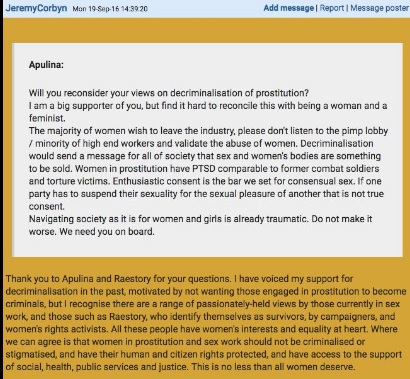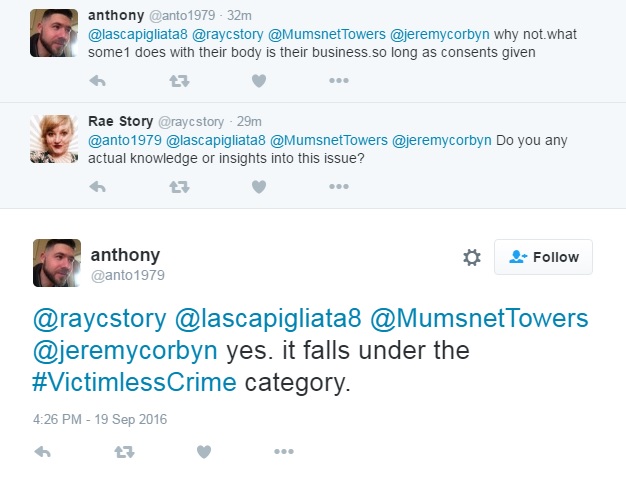Amnesty’s draft proposal to decriminalise all aspects of the sex trade is being debated this week and there have been numerous articles, blogs, research reports, comments and tweets about it all over the media. There is an enormous amount of research and counter-research which seems to prove one thing and then proves another, depending on whose interpretation you read, and which side you’re on. Funnily enough, despite the strong feelings on both sides of the argument, and the seemingly unbridgeable gulf between us, we do actually agree on the main premise, which is that the (mainly) women who provide sexual services to (mainly) men should be decriminalised. You wouldn’t know that from the decrim lobby, but it’s true! Feminists opposing the Amnesty International proposal are doing so, not because we want the women in prostitution to be punished in any way, but because we want the men who exploit the women to be held accountable. Full decriminalisation, however, would mean that all ‘sex-workers’ would be free to work legally with no restraints, and that includes pimps, brothel owners, strip club managers and other people who make money out of women’s sexual services. It’s that aspect which causes the conflict.
When this concern about decriminalisation is expressed though, (because of misgivings about the resultant free-for-all), the decrim side points to Amnesty’s assertion that there would need to be some regulation of the trade to make sure this doesn’t happen. Although nobody on either side is arguing for legalisation, it seems to me that ‘decriminalised with regulation’ is just another way of saying ‘legalised’. State regulation is definitely not wanted by ‘sex workers’ as it would interfere with the freedom of the individual to work, and the example of Germany with its legal mega brothels and vastly expanded sex trade is seen as a red herring. Decrim, we are told, would not be like that. The example of New Zealand is used to illustrate successful decriminalisation, but aside from the fact that there is no reliable evidence to suggest that the violence inherent in the trade has been reduced there, there is also the important point that New Zealand is a small and remote country compared to Europe, and therefore not as attractive to traffickers. None of the examples used by the decrim camp can comprehensively provide evidence of an increase in safety for the women in the sex trade there, or of a reduction in trafficking.
This is a complicated issue because, uniquely in this trade, empowering the ‘workers’ means unavoidably empowering the exploiters and abusers as well. Reducing the stigma for the women who sell sex automatically reduces stigma for the men who buy it. The side you pick then, depends partly on whether you are focusing on the women in the trade (and their safety), or the men who are paying for their services (and their exploitation), or on whether you think it’s possible to protect the women whilst discouraging the men at the same time.
Traditionally, prostitution has been a ‘women’s’ issue, in that the focus has (unfairly) been on the women’s role in the transaction: women are ‘whores’, ‘harlots’, ‘sluts’, ‘temptresses’, ‘fallen women’, whilst men are just men, in the background somewhere, being men. In one of the first stories we have that features the subject, Jesus famously forgives the prostitute her ‘sins’, but nowhere is there even any question that her customers may have needed forgiveness too. The assumption that the prostitute needed forgiveness is a given: the social stigma is all hers. Prostitution has never been equal: fallen women are sinners who lead men astray. A man does not suffer the same stigma for being a punter as a woman does for being a prostitute. If a man is murdered in the street he is not defined by whether or not he has engaged in paid-for sex, but a woman always is if she has offered it.
The focus on men and the part they play is way overdue. It’s currently fashionable to talk about agency, out of respect for those women who ‘choose’ to sell sex of their own volition and do not see themselves as victims. I can appreciate that, and acknowledge that they know their own minds, and their lives, better than I do – but as many women in the sex trade are there because they have been trafficked, forced or otherwise coerced, or indeed because their life choices are so limited, I think the agency of the men who buy should not be overlooked. Their agency is more unequivocal: they buy sex because they want to, and they can. When people define ‘sex work’ as ‘consensual sex between adults’ they fail to put it into the context of unequal choices, and therefore they conveniently ignore the exploitation involved. The Nordic model, favoured by the opponents of the Amnesty proposal, takes this on board by criminalising the buying of sex but not the selling, with the aim of reducing demand as well as protecting the women.
In my opinion, it is the reducing of demand which is the most important factor in the debate, in that only this will ultimately protect the most women in the long run. When legal restraints on the sex trade are lifted it means that the most vulnerable women and girls are even more vulnerable to exploitation. When an activity is illegal or regulated you know that the society you live in sees it as wrong, and sometimes that knowledge acts as a final safety net for girls vulnerable to coercion or grooming. Take that away and it can be much more difficult to say no: it’s like your abuse is state-sanctioned. In Germany the favoured method of pimping now is the so-called ‘lover boy method’, which, as it sounds, means forming a relationship with a girl with a view to persuading her to work in one of the brothels. The fact that prostitution is legal and state-regulated has not reduced the stigma, or the threat of violence, for the women, but it has made it easier for a man to persuade his ‘girlfriend’ to do something which, after all, is not illegal any more. And the punters are still not interested to know whether a girl is working there by choice or not, as long as they have access to her.
The other important point about removing any legal impediment to the trade is that market forces will then determine the fate of many women and girls. Businesses succeed by creating and then meeting demand, and an unregulated sex trade would have a business model like any other. The mega brothels in Germany have ‘Specials’ where customers are offered food and drink and a certain number of girls at a fixed price, in order to attract new customers: much like an all-you-can-eat buffet or a buy-one-get-one-free offer. In New Zealand some enterprising spin-off businesses offer ‘classes’ for girls wishing to enter the sex trade. People involved in legal businesses are free to advertise and recruit and find ways to grow their business. This will inevitably lead to an increase in demand, and as there are never enough women to meet the demand, there will have to be an increase in trafficking too.
In this particular sense it makes very little difference to outcomes whether the sex trade is legalised or decriminalised. Either way, the removal of restraints on business gives the green light to those who would exploit the demand and expand the trade. This is not a preferred outcome for women in general.
There may be a minority of women who identify as ‘sex-workers’ who wish to make their own choices and be protected from the harms of their chosen trade, and they deserve to be protected from the men that would harm them. Supporters of the Nordic model do not want to ‘throw these women under the bus for the sake of ideology’, as is sometimes suggested, and nor does their concern constitute a ‘moral crusade’. The Merseyside model of hate crime goes some way to helping protect women in the trade, and should be rolled out more widely, but at the end of the day the sex trade is a dangerous place to be, and being able to report a crime with more confidence does not mean you will be protected from suffering it in the first place. Whether indoor or outdoor, in a brothel or a flat, the violence can happen to anyone anywhere who is alone with a punter, and the idea that you can screen out the bad ones is a myth, according to many women who have exited the trade.
Unless the behaviour of the men who are punters can be challenged, the sex trade will continue to claim more and more victims, and most of these will be women and girls. The criminalisation of paying for sex would act as a deterrent to men, and send a strong message about what our society deems acceptable, and how it views and respects women. At the same time further work on equality needs to be made an urgent priority to provide better economic and life choices for women so that prostitution does not have to exist as a safety net for the most vulnerable in our society. It should be a source of shame to us all that this state of affairs exists in the twenty first century.
It should be possible, if the will is there, to protect current ‘sex workers’ whilst at the same time reducing the scale of the trade for future women and girls. The sex trade impacts disproportionately on women who are economically disadvantaged, indigenous women, migrants and BME women. Concentrating legislative decision-making on a minority of currently self-identified ‘sex-workers’ instead of looking at the broader picture of the devastation the trade brings to the lives of the most vulnerable women all over the world, will lead effectively to the ‘throwing under the bus’ of many many more women and girls – now and in the future.

